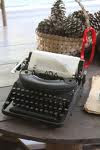Last Words
After a 10-year run, the Novel Spaces blog will post no more. Our archives remain available, however, for the thousands of visitors who still find themselves on this site every month.
Read, learn, enjoy and... Happy writing!
Read, learn, enjoy and... Happy writing!
Maggie King: "Years before I joined the Novel Spaces lineup, I admired not only the posts, but the cover collage. Sunny Frazier got me a guest post and in no time I landed a regular spot. Liane and the other authors are incredibly talented and generous. I’m happy to transition to a Facebook group … and that we’re keeping that collage!"
Liane Spicer: "I've been a member of the Novel Spaces blog community from the very beginning, and it's been a most rewarding journey. Thank you for your fellowship over all the years, dear Novelnauts, and heartfelt thanks also to our numerous guests and readers. My last words are borrowed from French writer Guy de Maupassant: "Get black on white." Just do it.
Linda Thorne: "Goodbye to an awesome blogspot. I’ve hung around Novel Spaces for years, visiting and commenting. In June of 2016 I had the honor of becoming one of the Novelnauts with my own regularly scheduled posts. Novel Spaces will be missed, but never forgotten."
Amy Reade: "Writers are readers first. Read a lot, read everything you can get your hands on, read all the time in lots of genres."
Carol Mitchell: "Write. Rest. Revise. Repeat.
I was recently approached by an author whose book I gave a mixed review a couple of years ago. He has revised the book and said to me, “I was ashamed of the work as it was.”
When people ask me for advice on writing, my first response is: Write. Get the story down because if you don’t nothing else is going to happen. However, eight years of reviewing and editing ‘first drafts’ masquerading as completed manuscripts has revealed to me that my advice is flippant, incomplete, and does an injustice to our craft. While the initial writing is obviously necessary, it’s often really a brainstorm, just the opening of the first door into the oft-time painful journey towards a completed book. Too many writers wrestle that first door shut then lean on it breathing heavily from the effort, resolved never to open the door again. But we must.
If you can give yourself the time to put down that first draft, come back to it with fresh, honest eyes willing to rip it apart not once, not twice, but as many times as necessary, and then to be open to having someone else do the same, you may emerge on the other side of the process with a true reflection of your story that you’ll be proud to present to the world."
The Novel Spaces community wishes you all the best in your publishing career.









